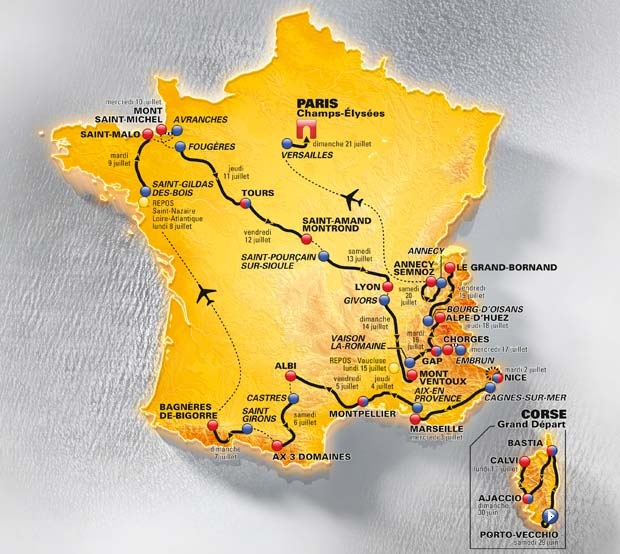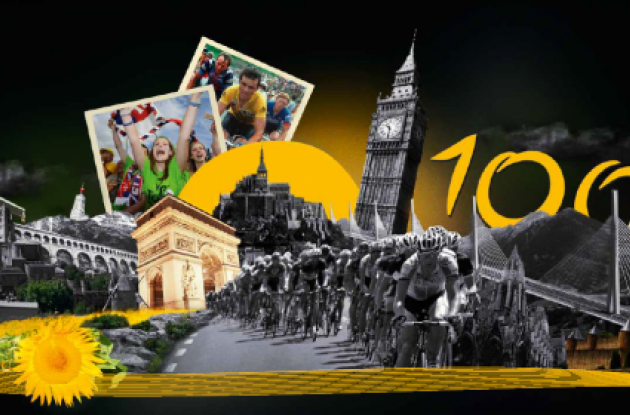2013 Tour de France Route Review
The unveiling of the route of the 100th edition of the Tour de France took place in Paris, France. Before the official announcement there was, as always, many rumors regarding the route. While there was no doubt that the Alpe d’Huez would be a prominent feature in the 2013 Tour de France, some thought the final stage of the Tour would end on this famous climb, ruining any sprinter’s chance of a stage victory. Others speculated there would a time trial on the Champs-Elysees.
The big reveal from Tour de France director Christian Prudhomme was the fabled Alpe d’Huez would be climbed twice in the same stage (stage 18) and the final stage would stick to tradition and conclude on the Champs-Elysees. However, it would start in the early evening and finish at approximately 9 pm. This night time finish will ensure some fantastic photos.
It is only natural that to celebrate the centennial of the Tour, the race is one-hundred percent French, meaning there are no excursions outside its regions. The racers will face 3,360 kilometers. Included are three time trials (one team and two individual) for a total of 90 kilometers. No Tour is complete without mountains and this edition features six mountain stages with four summit finishes. The sprinters will have their opportunities as seven stages are classified as flat – the first being stage 1 in Corsica.
For the first time the 100th Tour de France starts in Corsica, famously known as the island birthplace of Napoleon Bonaparte. Classified as a région of France, Corsica has never before been included in the parcours of the Tour.
Corsica is one of the most mountainous islands in the Mediterranean, comprised of approximately two thirds mountains. The three stages on the island zig-zag across the countryside, which will make for nervous riding. Tour organizer A.S.O. has avoided the hills on the first day to ensure that tradition is followed and a sprinter rules the day. The following two days are tougher as the riders ride across the island and face the mountainous region.
The riders return to mainland France for the remaining stages starting in Nice – the site of the team time trial. This is a stage that requires the team to fire on all cylinders as a slight misstep can bring the whole squad to the ground. Also, this stage not only shows who has the strongest team, but what rider is the weakest link. While it won’t determine the overall Tour de France winner, we’ll get a good idea of the real favorites.
In comparison to last year’s Tour, the overall distances in the race against the clock have been reduced. Last year’s winner Bradley Wiggins dominated that discipline and put many of the contenders out of the running for the overall. This made for a boring race. Hopefully this change will create some drama in the 2013 edition.
The true mountains surface in stage 8 – the Pyrénées. The following stage is another day in the mountains with five climbs. Thankfully the next day is one of the Tour’s two rest days. By now the favorites will be revealed.
Bastille Day is July 14th, falls on a Sunday, and brings us stage 15 – the Mont Ventoux stage. This is France’s national holiday and the ascent of Ventoux will be packed with fans. This is also the longest day in the saddle for the peloton – 242 kilometers. Race favorite Chris Froome took to twitter and described stage 15.
“I’ve never ridden Ventoux but at the end of a 240km stage after 2 weeks of racing, that is going to be tough...”
Stage 17 is the final time trial of the 2013 Tour de France. The race against the clock hasn’t been placed this far from the finish since 1975. The reason for this is it allows the riders who have had a bad day time to recover any lost time in the mountain stages remaining – three stages for a combined distance of 140 kilometers to be exact. The next stage will be the place to crawl back lost time.
Stage 18 is the one of the highlights of the Tour – Gap to Alpe d’Huez. As mentioned, the Alpe d’Huez is climbed twice and the fans will be beside themselves as this is a rare opportunity for them to see the peloton twice in the same stage. On each of the 21 switchbacks of the Alpe d’Huez is a sign with the name of one of the riders who have won here. By the time the peloton reaches this stage Lance Armstrong’s name may have been removed from two of the turns. There is serious discussion to erase the disgraced rider from the history of the Tour de France and that could mean removing his name from the switchback signs.
The penultimate stage is Annecy-Semnoz, a short day at 125 kilometers but finishes on the Semnoz mountain – a brute at 6 miles in length with an average gradient of 8.5%.
Paris is known as “the city of lights.” That will never be more true as the peloton will finish under the lights with an evening stage. With the stage finishing by 9pm it will be a long day for the journalists following the race and trying to make a deadline. The payoff will be a visually spectacular night of racing and the stage will surely be won by a sprinter.
Bradley Wiggins of Team Sky is the defending Tour champion, but due to the lack of time trials it is reported he is focusing on the Giro d’Italia. A five star favorite is his teammate Chris Froome. The Kenya born racer showed that he is almost on par in the time trials with Wiggo and probably a better climber. Froome’s style could match Contador pedal stroke for pedal stroke in the mountains.
Speaking of Alberto Contador, he returned from his suspension and took the overall general classification in the 2012 Vuelta a Espana. His explosive style of climbing combined with his strength in the time trial discipline also ranks him as a strong favorite.
BMC Racing Team’s Cadel Evans is also on the short list for potential winners. In a team press release Evans was hopeful of his chances in the 2013 Tour de France.
“In the last week, we won’t have an idea who’s going to eventually be the winner in Paris,” he said. “It’s long on road stages, but shorter on time trial kilometers. I think it suits me a little bit better than 2012. It’s a real mix and variation of stages right from the start to the finish. That third week is going to be very tough.”
Andy Schleck is the unknown variable. After Contador’s disqualification from the 2010 Tour, second place finisher Schleck was awarded the overall victory. However his 2012 season has been a disaster. The big question mark is will Schleck bounce back and be a worthy contender?
2013 Tour de France Stage List
June 29 1st stage: Porto-Vecchio—Bastia, 212 km
June 30 2nd stage: Bastia—Ajaccio, 154 km
July 1 3rd stage: Ajaccio—Calvi, 145 km
July 2 4th stage: Nice—Nice, 25 km (TTT)
July 3 5th stage: Cagnes-sur-Mer—Marseille, 219 km
July 4 6th stage: Aix-en-Provence—Montpellier, 176 km
July 5 7th stage: Montpellier—Albi, 205 km
July 6 8th stage: Castres—Ax-3 Domaines, 194 km
July 7 9th stage: Saint-Girons—Bagnères-de-Bigorre, 165 km
July 8 Rest day at Saint-Nazaire
July 9 10th stage: Saint-Gildas-des-Bois—Saint-Malo, 193 km
July 10 11th stage: Avranche—Mont-Saint-Michel, 33 km (ITT)
July 11 12th stage: Fougères—Tours, 218 km
July 12 13th stage: Tours—Saint-Amand-Montrond, 173 km
July 13 14th stage: Saint-Pourçain-sur-Sioule—Lyon, 191 km
July 14 15th stage: Givors—Mont Ventoux, 242 km
July 15 Rest day in Vaucluse
July 16 16th stage: Vaison-la-Romaine—Gap, 168 km
July 17 17th stage: Embrun—Chorges, 32 km (ITT)
July 18 18th stage: Gap—Alpe d’Huez, 168 km
July 19 19th stage: Bourg-d’Oisans—Le Grand-Bornand, 204 km
July 20 20th stage: Annecy-Semnoz, 125 km
July 21 21st stage: Versailles—Paris Champs-Elysées, 118 km








